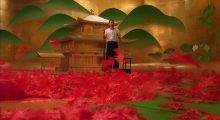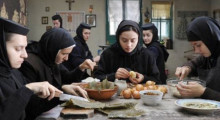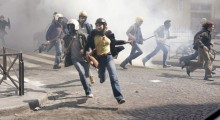Cristian Mungiu
-
Cannes 2022: Brother and Sister, Pamfir, R.M.N.

Arnaud Desplechin’s Brother and Sister ended to the audible reception of somewhere around seven boos, two derisive whistles and nothing else; if you’re someone who believes indifference is a worse reaction than active hostility, this somehow seemed to split the worst possible difference. Consensus holds, not inaccurately, that Desplechin’s peak work is, at least for now, behind him, with the arguable exception of My Golden Days—non-coincidentally, a prequel to 1996’s My Sex Life. His experiments outside of erratic interpersonal dramas, like 2011’s self-explanatorily titled Jimmy P.: Psychotherapy of a Plains Indian and 2019’s crime drama Oh Mercy!, have been received with tepid bewilderment. I have more sympathy for these […]
by Vadim Rizov on May 22, 2022 -
Schrader’s Mishima, Cristian Mungiu on Criterion and Dear White People: Jim Hemphill’s Weekend Viewing Recommendations

In a nice bit of cinematic serendipity, Paul Schrader’s singular 1985 film Mishima: A Life in Four Chapters arrives on Blu-ray from Criterion at the same moment that his latest movie, First Reformed, is enjoying a deservedly successful art house run. Mishima remains perhaps Schrader’s most original and idiosyncratic film, which is really saying something; a meditation on the life and writings of Japanese author Yukio Mishima, it’s neither a conventional bio-pic nor a straightforward literary adaptation, though it combines elements of both forms. Schrader, writing in collaboration with his brother Leonard (Kiss of the Spider Woman) and sister-in-law Chieko, […]
by Jim Hemphill on May 25, 2018 -
Helicopter Parent: Cristian Mungiu on Graduation

Cristian Mungiu’s feature debut, 2002’s Occident, was an accomplished exercise in the then-fashionable mode of multiple narratives, which slowly overlap and converge, but it wasn’t until 2007’s 4 Months, 3 Weeks and 2 Days that he received significant international attention. Building on the style established by his contemporary, Cristi Puiu, in 2005’s The Death of Mr. Lazarescu (as well as using Puiu’s DP Oleg Mutu), Mungiu crafted an intense portrait of a woman trying to get a proscribed abortion in the waning days of Ceaușescu’s Romania. The film won the Palme d’Or, solidifying the rise of the Romanian New Wave. […]
by Vadim Rizov on Apr 13, 2017 -
TIFF Critic’s Notebook 3: Hermia & Helena, The Dreamed Ones, Graduation

Matías Piñeiro has been living in NYC for a few years now, so it’s logical he’d eventually make a film set at least partially there. I can’t pretend to a lack of rooting interest: I know, casually or closely, a semi-significant number of people who worked on or acted in this, did a set report (meaning I spent part of the first viewing waiting to see what was actually being said in the shot I saw filmed) and, if you go to a lot of rep cinema in the city, Piñeiro — a serious, inveterate cinephile — is just kind of generally around. Hermia […]
by Vadim Rizov on Sep 10, 2016 -
This Is Different: Cristian Mungiu on Beyond the Hills

Cristian Mungiu’s latest feature, Beyond the Hills, confirms suspicions that were aroused by his previous, the Palme d’Or-winning 4 Months, 3 Weeks and 2 Days. What’s been confirmed is that Mungiu is that rare blend of filmmaker who seems destined to produce first-class auteurist art cinema. Mungiu blends two distinct types of filmmaking into one carefully distilled whole: his films address critically pressing social issues that are irrefutably relevant, but they also are formalist aesthetic works that are very much about the nature of cinema itself. There are plenty of serious filmmakers who tackle either one interest or the other, […]
by Zachary Wigon on Mar 7, 2013 -
VIFF Critics Notebook #2

The Dragons & Tigers section has been the richest part of VIFF’s legacy, dating back to 1994. Each year, the Award for Young Cinema has highlighted an as yet unrecognized talent of East Asian cinema. This year the Dragons & Tigers jury was made up of Shinozaki Makoto, Joao Pedro Rodrigues and Chuck Stephens. I was able to see a few films from the competition, including the winner Emperor Visits the Hell, directed by Li Luo. An often perplexing, but always interesting film, Li’s movie transports a story (three chapters) from the Ming Dynast novel Journey to the West to […]
by Adam Cook on Oct 15, 2012
